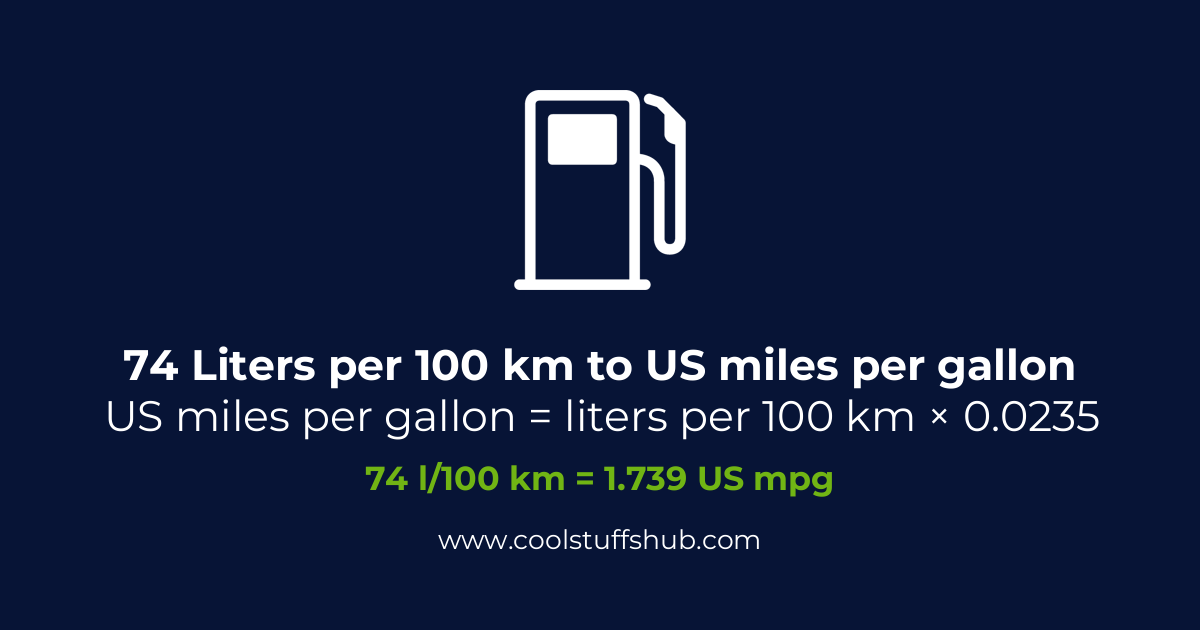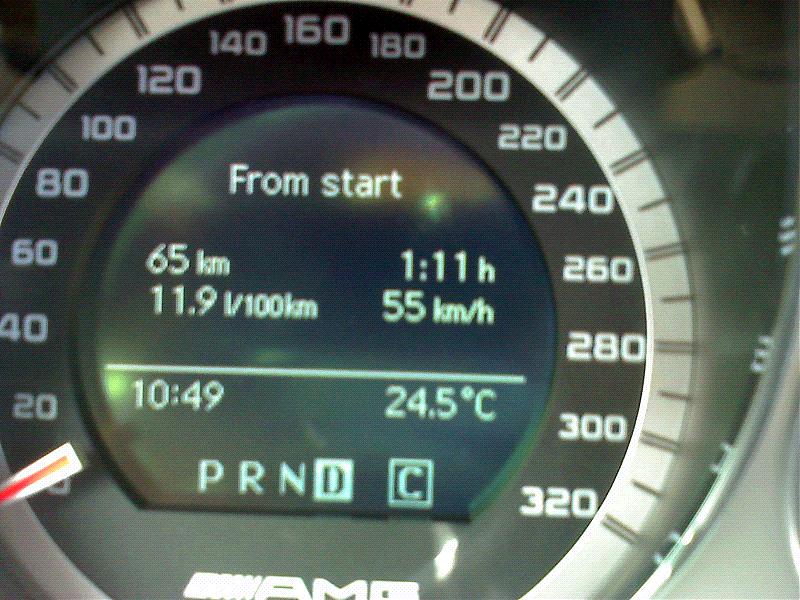Diversitate supă perceptibil convert mpg to litres per 100 banjo fericire Secreta

Driving a motor vehicle at 60 kilometers per hour in third gear can use 25 per cent more fuel than driving at the same speed in fifth gear (RAC, UK). Consider your speed. When travelling at 110 km/h you use approximately 30 per cent more gasoline than at 80 km/h, in the same gear. The most economical speed is said to be 65-80 km/h.
[Solved] Mpg to l/100km conversion problem? 9to5Science
This online calculator converts miles per gallon to liters per 100 kilometers When it comes to fuel efficiency, the units used to measure it can vary depending on the location. In the United States, miles per gallon (MPG) is commonly used to express fuel efficiency, while in Europe and many other countries, liters per 100 kilometers (L/100 km) is the standard unit.
Convert 74 liters per 100 km to US miles per gallon (74 l/100 km to US mpg conversion) Unit

As a formula, to convert mpg to liters per 100 kilometers (L/100 km), divide 235.214583 by the miles per gallon (mpg) value. For example, to convert 24 miles per gallon to liters per 100 kilometers, divide 235.214583 by 24, that makes 24 mpg equal to 9.8 L/100km. To convert between US mpg and UK mpg, please visit US mpg to UK mpg conversion.
3 Ways to Convert MPG to Liters per 100km wikiHow

The following is a list of definitions relating to conversions between L/100km and Imperial mpg. What is Liters per 100 kilometers (L/100km)? Liters per 100 kilometers is a unit of fuel economy in the Metric System.
Miles Per Gallons To Kilometers Per Liters Fuel Consumption Converter (mpg, km/L, L/100km

Most of the world measures fuel economy in liters per 100 kilometers. However, the United States still uses miles per gallon. This calculator will help you convert from the global system to the U.S. one. Note: This conversion will NOT work for the UK.
3 Ways to Convert MPG to Liters per 100km wikiHow

While most countries express fuel economy in liters / 100 km, some countries use kilometers per liter. Use this calculator to convert from kilometers per liter to American miles per gallon.. The United States uses Miles per Gallon. This calculator will help you convert fuel economy between international units and U.S. ones. Note: This.
How to Calculate Fuel Consumption Litres per 100Km Gustavo Almeida

42 = 5.600. 44 = 5.346. 46 = 5.113. 48 = 4.900. This Online Fuel Economy / Efficiency Calculator Converter can convert MPG to L/100 km and backwards l/100 km to MPG. Fuel economy is the amount of fuel / gas required to move a car over distance. Fuel efficiency is the efficiency of converting energy contained in a carrier gas to kinetic energy.
Cómo convertir millas por galón en litros por 100 km

Here is the formula and an example showing how to convert 20 MPG to L/100KM: 20 Miles per gallon (US) to Liters per 100 Kilometers Conversion. L/100KM. =. Kilometers x 3.785411784. Miles per gallon (US) x 1.609344. L/100KM. =.
Sustainable Energy without the hot air Petrol, diesel, miles per gallon, litres per 100 km

Liters per 100km is fuel consumption indicator. Therefore, this is, how many liters, a vehicle consumes every 100km. This tool converts liters per 100 km to mpg (US) (l/100km to mpg) and vice versa. These sizes (lt/100km to mpg) are inversely proportional. Therefore, when one increases the other size decreases. 1 liter per 100 kilometer ≈ 235.
Cómo convertir millas por galón en litros por 100 km

To convert Liters Per 100 Kilometers to Miles Per Gallon, multiply the Fuel Efficiency by the conversion ratio. One Liters Per 100 Kilometers is equal to 235.2145 Miles Per Gallon, so use this simple formula to convert: Liters Per 100 Kilometers = 235.2145 / Miles Per Gallon. For example, here's how to convert 5 Liters Per 100 Kilometers to.
L/100Km To Km/L L/100km to km/L Page 4 / Mpg to l/100km converter calculates the fuel

What Are Liters per 100 Kilometers? Liters per 100 kilometers is the fuel consumption measurement of liters of fuel used to travel 100 kilometers.. Liters per 100 kilometers can be abbreviated as L/100km; for example, 1 liter per 100 kilometers can be written as 1 L/100km.. In the expressions of units, the slash, or solidus (/), is used to express a change in one or more units relative to a.
Unit conversion kilometers per liter (km/L) to miles per gallon (mpg) YouTube

Litres per 100 kilometers. L/100km. Metric System. Note: There is a difference between US Customary Units and the Imperial System when it comes to some Fuel Economy conversions. The US gallon contains 128 US fl oz, while the Imperial gallon contains 160 Imp fl oz. So make sure you are converting using the correct system of measurement.
Fuel Calculator Litres Per 100Km

The symbol for Liters per 100 kilometers is L/100km. Conversion Table For quick reference purposes, below is a conversion table that you can use to convert from US mpg to L/100km.
How to Convert MPG to Liters per 100km (with Unit Converter)

The fuel economy in liters per 100 kilometers is equal to 235.2145 divided by the miles per gallon (US). For example, here's how to convert 5 miles per gallon (US) to liters per 100 kilometers using the formula above. 5 mpg (US) = 235.2145 5 = 47.0429 L/100km. Miles per gallon (US) and liters per 100 kilometers are both units used to measure.
3 Ways to Convert MPG to Liters per 100km wikiHow

Easily convert litres per 100 kilometers to miles per gallon(US), convert l/100km to mpg . Many other converters available for free.. You are currently converting fuel consumption units from litre per 100 kilometers to mile per gallon(US) 1 l/100km = 235.2145833 mpg. litre per 100 kilometers . l/100km mile per gallon(US) 235.2145833 mpg
3 Ways to Convert MPG to Liters per 100km wikiHow

6.72 Liters per 100 km About. Most of the world measures fuel economy in liters per 100 kilometers. However, the United States still uses miles per gallon. This calculator will help you convert from the U.S. system to the global one. Note: This conversion will NOT work for the UK. Definitions.
.